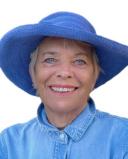Humor
What I Learned From Cubans About Mental Health
Cuba has a lot to teach us about mental health.
Posted October 14, 2019
“I want you to tell people what Cubans are really like,” said Marta, the manager of the new hotel Chateau Blanc in Havana.
“I am not sure you can generalize about people in a country,” I protested.
“Well, you are going to be traveling around Havana and then destinations outside of Havana. You will see for yourself. And then you can write about it.”
Marta is a self-confessed, proud communist. “People in your country are afraid of communists, so I am happy to talk with anyone to explain. Before the revolution here, my family suffered a lot. We were poor. We couldn’t afford medical care or education. Since the revolution, everyone has access to free medical care and education. And everyone has a ration card, so there is no one starving. Every month, no matter who you are, you present your ration card, and you get food.”
Those were Marta’s words, but her actions spoke more loudly. When I left the hotel, I handed her money and thanked her for all her help during my stay. I know how poor Cubans are, how little they have, and anyone, at any level, could use a supplement. But Marta would not take the money.
“I don’t have a lot,” she said, “but I have enough. You don’t need to give me a tip. If you are happy, that is enough satisfaction.”
Whew. I wasn’t expecting that.
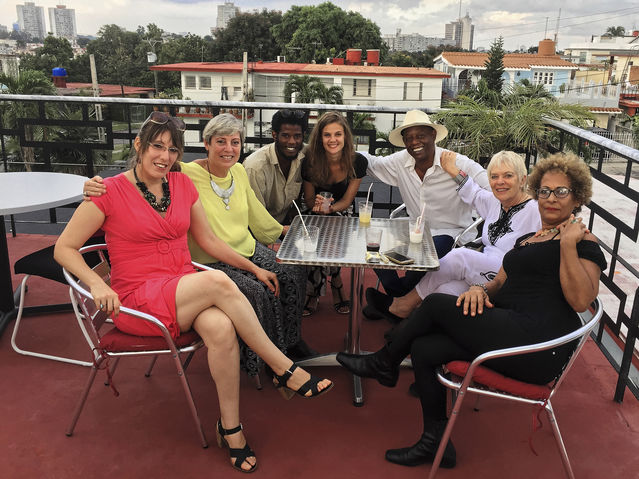
During my stay in Havana, my friend Aysha connected me to her dear friend Susana Haug, a professor of Latin American studies. Susana’s English is so good she could easily pass for a very educated native speaker. She has very low income, a lot of problems at home, but when we attended the official opening of the Chateau Blanc together, and I asked who wanted to dance, she was the first one to bounce out of her seat.
She was full of joy and humor, and I was trying to think of what I could do to make her life easier when she presented me with a gift. I carefully opened the wrapping, and inside was a beautifully painted set of Cuban-designed-and-made teacups and a saucer made for two cups. I was flabbergasted at her generosity when she has so little.
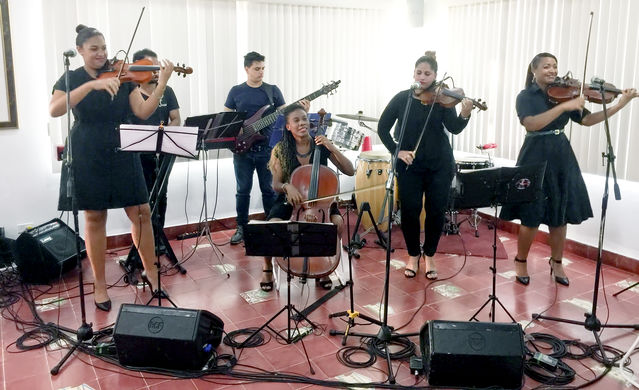
I was also invited to dinner at the home of Aysha’s adopted family. Aysha is the commadre, or godmother, of 4-year-old Enzo, and she is like a sister to Enzo’s mother, Kari. She is also close to Ivon, Kari’s mother, and her husband Alberto Guerra Narajno, one of Cuba’s top authors. Also present at the table were Kari’s sister, Kari’s boyfriend, her daughter, and her grandmother.
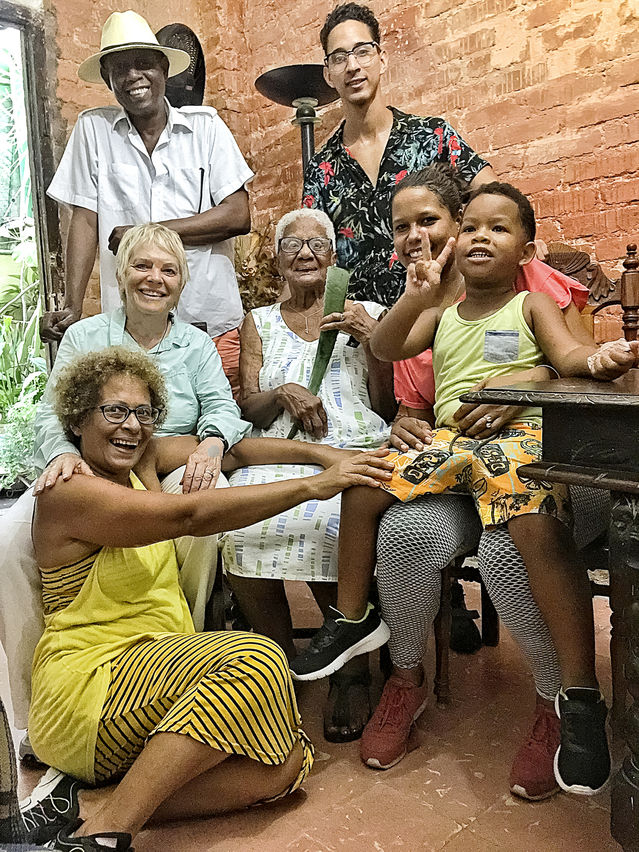
I wondered how the family would provide food for dinner. The U.S. has just ramped up the blockade of Cuba and put heavy economic pressure on the countries that usually deliver oil to the country. As a result, no oil was coming into the port, which meant that lines were up to five hours long for gas.
Schools and offices were shutting early to save electricity. There was a shortage of rice and chicken. Cubans were suffering from no access to medicine and medical supplies from the U.S. Cuban relatives in the U.S. learned they were no longer allowed to send as much money to help their Cuban families.
To my astonishment, no one complained. When I asked them about their lives, they reported that they made $15 to $30 a month as professionals in law and pharmacy, so, instead, they worked in a hotel, where they made more money from tips and salaries. But the U.S. has now banned cruise ships from going to Cuba, so the streets were almost devoid of tourists.
But why weren’t they complaining? Havana is expensive. It cost me about $15 to get to Ivon’s house in a cab; that was Kari’s monthly salary.
The meal came, and it was delicious. Chicken with rosemary and corn, peas, red pepper, and cucumber. And everybody laughed and talked and was in excellent humor.
I ate very little, as I was so conscious of what the food must have cost them, but they kept urging me to eat more. Finally, I had to ask them how they tolerated the blockade, the lack of medicine, the shortages, the hardship.
“When there is a stiff wind,” they told me, “Cubans bend, but they don’t break.”
After we had all drunk a little rum, I asked them why they hadn’t developed democracy. The ideals of the revolution were apparent, but Cubans were still strangled by the rules and bureaucracy and Soviet-style lack of freedom.
“The U.S. is a fat giant with its foot on Cuba’s neck. That’s why we haven’t developed democracy,” one of them said. With the ever-worsening blockade and restrictions, great energy goes into feeding the population and survival.
“We have two blockades here in Cuba,” a number of young Cubans told me as I traveled around the country. “There is the blockade of the U.S., and the blockade inside of Cuba.”
They yearned for more freedom and less control of their lives. But it didn’t keep them from enjoying their lives, seeing friends, laughing, and accepting the daily grind they live with to survive.
“It’s what we do,” a young couple said. “It’s just the way it is.”
I spoke to people who were waiting in line to get gas. They laughed and shrugged when I expressed sympathy.
“We have been doing without for 60 years,” a woman told me. “So, we’re used to it.”
I’m pretty gregarious and willing to make a fool of myself by speaking sub-kindergarten Spanish because my goal is to communicate with people. As long as we understand each other, it’s fine. So I spoke to hundreds of Cubans of all ages, shapes, sizes, political persuasion, ethnicity, and religions in Havana, Cienfuegos, Palmira, Trinidad, Santa Clara.
I saw how little they had. I saw that our guide was a vice-consul who survived economically by driving a cab. But no one complained. They explained, they were frank about their situations, but they didn’t whine and bemoan their fate.
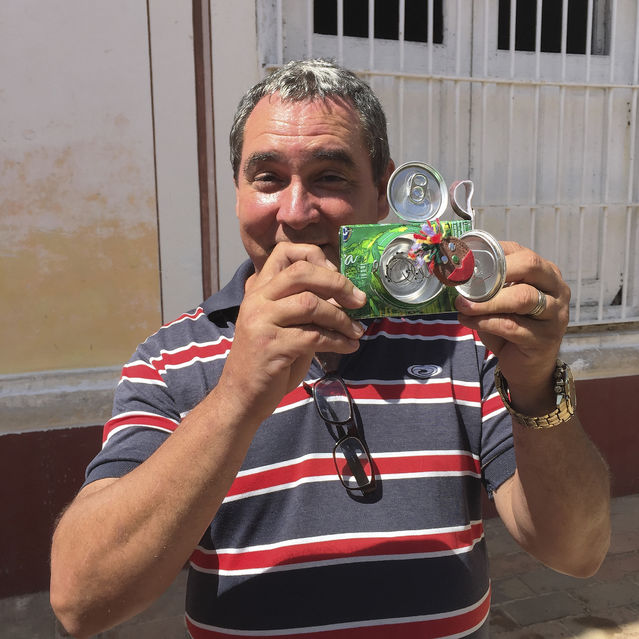
The gas situation got worse. The lack of tourists was an added hardship. Some vendors, bereft of customers, seemed edgy. People occasionally asked for money in the streets, or, after we spoke for a few minutes, requested that I buy them a drink. I forgave them for their hustle because they are really struggling.
“I saw how Cubans are,” I told Marta when I saw her again at Chateau Blanc before leaving the country. “They are really, really strong. I am used to a lifestyle where people moan if a store is temporary out of their favorite jeans. We have so much stuff. It’s hard to try to get rid of it. We get stressed if we can’t get our young children into the right school. We worry about labels and trends. There is something crazy about it all. I feel like people have so little in Cuba, and I know they have problems, but they shrug, smile, know they can survive most anything, and go on with their lives. I felt as though I were getting a glimpse of an unfamiliar kind of sanity."
“Write about it, tell people who we are,” Marta said.
And this is my first attempt at doing that.
x x x x x
